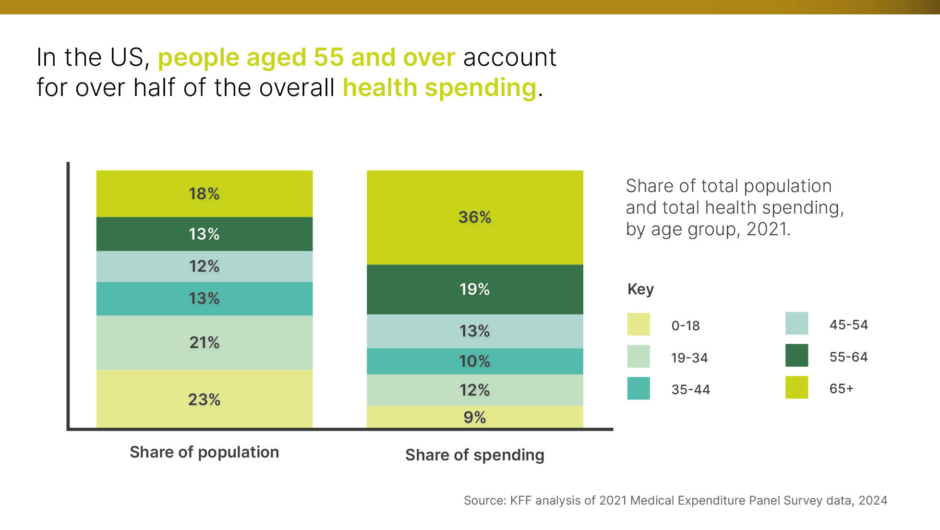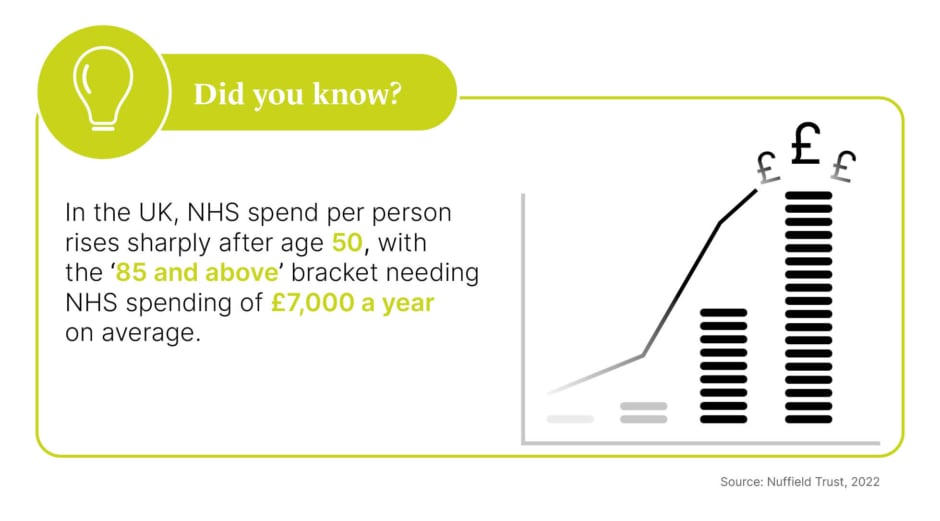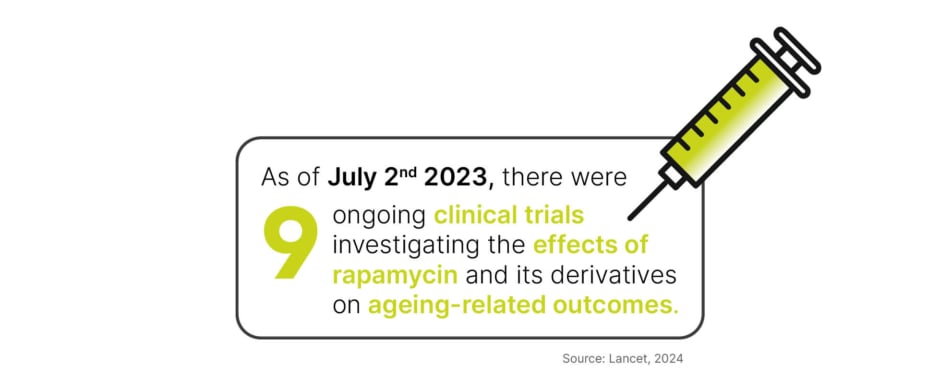If health is wealth, then finding a ‘cure’ for ageing could save healthcare systems millions. While immortality is an unlikely endpoint, could reducing the effects of ageing be the next big frontier for the pharma industry?
Words by Jade Williams
If there is one universal constant in the world, it is that the sands of time cannot be stopped. From crumbling buildings to drying riverbeds, the years march on, and as Shelley puts it in his poem Ozymandias – even the most formidable empires are eventually consumed by time.
In today’s rapidly growing and changing world, ageing is one of the greatest challenges facing healthcare systems. Although not a disease in its own right, ageing lays the foundation for a host of health problems, from diabetes to osteoporosis, arthritis, Alzheimer’s and more. This puts the pharmaceutical industry at the forefront of a new frontier – the fight against ageing itself.
Live healthier for longer
According to Olivier Ropars, Division Vice President, Lingo Biowearables, Abbott, “90% of US healthcare costs are to support chronic diseases”, and many of these, such as cardiovascular disease, strokes and cancer, are directly linked to ageing.
With this in mind, as populations around the world grow older, the burden on healthcare systems will only grow with it. “We need to figure out, as societies age, how to keep older people healthy and productive and independent for a longer period of time,” states Venki Ramakrishnan, Nobel Prize-winning molecular biologist, speaking at WIRED Health 2024. He believes the goal should no longer just be helping people to live longer – but to live healthier for a longer period of time.
In his talk, Ropars goes on to reference the great Roman poet Virgil to explain the value of his theory. “The greatest wealth is health,” he states. According to Ropars, people in the UK only have 63 years of healthy life – and spend the rest in poor health. While pharma has long been focused on treating the specific diseases and conditions associated with ageing that may come on after those 63 years, the industry has lacked focus on the core issue.
90% of US healthcare costs are to support chronic diseases

Potential candidates
In recent years, however, there has been a paradigm shift towards addressing ageing itself as a therapeutic target. Companies like Unity Biotechnology, resTORbio and Elysium Health have already taken steps into the field. They are investigating drugs such as metformin and rapamycin for their potential to slow down the ageing process.
Rapamycin, discovered on the island of Rapa Nui off the coast of Chile, has incredibly potent anti-tumour properties and has been used primarily to prevent transplant rejection. This is due to its strong immunosuppressant nature, and scientists have speculated whether it could be one day be used to in the field of ageing as well.
But Ramakrishnan warns that, despite its benefits, rapamycin can make patients susceptible to infection and slow wound healing. “You need to find that sweet spot between not having the side effects and having beneficial effects,” he explains. If pharma were to harness the preventative-ageing power of rapamycin, it would need to balance improved longevity with a weakened immune system – which already becomes weakened during old age.
In pursuit of this ambition, a team led by Edinburgh University researchers have developed an AI algorithm capable of discovering chemicals that target cells linked to age-related problems, or ‘senescent cells’. The technology has identified 21 potential drug candidates with senolytic activity for experimental testing – which means we could see more products entering the field in the near future.
Creating clinical trials
Transitioning from preclinical research to actual clinical trials targeting ageing, however, poses unique challenges. Unlike traditional disease endpoints, ageing is a complex, multifaceted process with no clear biomarkers or universally accepted metrics for measurement. This makes clinical trial design for ageing incredibly challenging – at how young would people need to be enrolled and how long could a trial last for?
As of today, the world’s longest clinical trial is still in progress. The study of the Botulinum Toxin (BoNT) for involuntary movement disorders has been in trials since November 1985 and it has 2,000 patients enrolled. At almost 40 years, this study examining long-term use of BoNT could prove as a useful blueprint for companies looking to enter the ageing space and run decades long trials – but is 40 years enough to truly study the effects of ageing? Studies may need to extend into 60-, 70-year cycles, and while digital twins may help in this regard, real world data will be hard to gather.
Nevertheless, thanks to $40m in financial backing, California-based biopharmaceutical company Rubedo Life Sciences recently announced plans to start phase 1 clinical trials for their drug that targets the effects of ageing. Targeting senescent cells, Rudebo’s first trial will measure the drug’s effect on skin conditions associated with ageing – with human trials expected to follow. This will also be an important case study for others looking to trial other therapies in the future.
We need to figure out how to keep older people healthy, productive and independent for longer

The wealth divide
In addition to practical issues, ethical considerations surrounding the pursuit of ageing interventions are also rife. While extending health span and delaying age-related decline may be noble goals, there is a fine line between enhancing quality of life and pursuing immortality. Questions regarding access, affordability and equity must be addressed to ensure that any breakthroughs in ageing therapeutics benefit society as a whole, rather than exacerbating existing disparities.
American entrepreneur Bryan Johnson, Founder and CEO of the extreme health food and supplement company Blueprint, has been investigating whether blood transfusions could be the answer to a cure for ageing. Johnson’s son had a litre of his blood taken and put into his father’s body as part of his father’s quest to keep himself younger for longer. A feat unattainable for most of the world’s population, Johnson, who has a dedicated ‘Don’t Die!’ community on his website, spends at least $2m a year on attempts to retain his youth and avoid death.
Potential pay off
Despite the challenges, the potential market for ageing interventions is enormous. With the global population ageing rapidly, there is a growing demand for therapies that can mitigate physical and cognitive decline. The global anti-ageing market, inclusive of everything from anti-wrinkle products to invasive procedures, is projected to reach $66.96bn by 2025, driven by an increased awareness of age-related health issues and advancements in medical technology.
According to Ramakrishnan, there are about “700 startups with many tens of billions of dollars invested in the last decade or so” in the ageing market. Much of these efforts have been focused on the aesthetic concerns relating to ageing, but this means plenty of the market remains undiscovered when it comes to alleviating health conditions and concerns that come with old age.
For the pharmaceutical industry, tapping into this market represents a significant opportunity for growth and innovation. By investing in research and development focused on ageing, companies can not only address unmet needs but also establish themselves as leaders in an almost entirely new field.
While there may never be a single ‘cure’ for ageing, interventions that slow down the ageing process and extend health span are certainly within reach. By embracing this challenge with ethical integrity and an appetite for discovery, pharma could play a pivotal role in alleviating the burden of an ageing world on healthcare systems worldwide.










